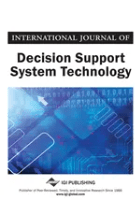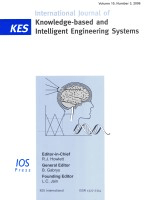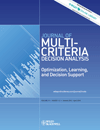
Fuzzy Optimization and Decision Making
metrics 2024
Empowering Decisions Through Fuzzy Optimization Excellence
Introduction
Fuzzy Optimization and Decision Making, published by Springer, is a prestigious academic journal that has made significant contributions to the fields of Artificial Intelligence, Logic, and Software. With an impressive impact factor and a consistent ranking in the top Q1 quartile across its categories, this journal stands at the forefront of research dissemination in its domain. Established in 2002 and continuing through 2024, the journal focuses on the theoretical and practical aspects of fuzzy optimization methods and their applications in decision-making scenarios. The journal is highly regarded for its rigorous peer-review process and aims to present innovative research findings that inspire advancements in optimization techniques using fuzzy logic. Aimed at researchers, professionals, and students alike, Fuzzy Optimization and Decision Making serves as an essential resource for those looking to stay at the cutting edge of technology and methodology in mathematics and computer science.
Metrics 2024
 1.46
1.46 4.80
4.80 4.70
4.70 64
64Metrics History
Rank 2024
Scopus
IF (Web Of Science)
JCI (Web Of Science)
Quartile History
Similar Journals

INTERNATIONAL JOURNAL OF APPROXIMATE REASONING
Navigating the Landscape of Innovative ReasoningThe INTERNATIONAL JOURNAL OF APPROXIMATE REASONING, published by Elsevier Science Inc, stands as a pivotal resource in the domains of applied mathematics and artificial intelligence. Since its inception in 1987, the journal has evolved into a leader in its field, boasting an impressive impact factor and ranking within the top quartile for applied mathematics (Q1) and high standings in artificial intelligence and software categories according to the 2023 Scopus rankings. As researchers, professionals, and students delve into complex issues surrounding reasoning under uncertainty, this journal provides invaluable insights and cutting-edge research. In addition to its rich content, the journal's commitment to advancing knowledge in theoretical computer science further enhances its significance in fostering academic growth. While the journal does not currently offer open access, its rigorous peer-review process ensures that only high-quality, impactful studies are published, solidifying its role as an essential source for academics striving to remain at the forefront of their fields.

EURO Journal on Decision Processes
Illuminating the Science Behind Effective Decision ProcessesThe EURO Journal on Decision Processes, published by ELSEVIER, is a premier open-access journal dedicated to the multidisciplinary field of decision-making processes in various contexts, including applied mathematics, business, and management. Since its inception, the journal has leveraged its platform to foster innovative research and discussions among scholars and practitioners. With a commendable impact reflected in its 2023 Scopus rankings and Category Quartiles, specifically Q2 in Applied Mathematics and Business, Management and Accounting, the journal stands as a vital resource for advancing the understanding of decision-making methodologies and frameworks. Notably, the journal has embraced open access since 2021, increasing visibility and accessibility for researchers and students alike. The scope encompasses a wide array of topics, reflecting the complexities of decision science in today's dynamic environments, making it an essential publication for those seeking to contribute to and engage with the frontier of decision processes research.

International Journal of Decision Support System Technology
Empowering Decisions Through Innovative Technology.International Journal of Decision Support System Technology, published by IGI Global, is a leading publication in the field of decision support systems, bridging the gap between theoretical advancements and practical applications. With its ISSN 1941-6296 and E-ISSN 1941-630X, this journal has been a prominent platform for researchers and professionals since its inception in 2009. Covering a wide range of topics within the realms of Computer Science and Modeling and Simulation, it currently holds rankings of Q3 and Q4, respectively, in the 2023 category quartiles. The journal is committed to disseminating innovative research that enhances decision-making processes through advanced computational techniques. Even without an open access option, it maintains a robust academic presence and aims to foster collaboration among scholars, making it an invaluable resource for students and professionals eager to stay at the forefront of technology and decision-making methodologies. With a focus on accessibility and relevance, the International Journal of Decision Support System Technology continues to shape the future of decision support research.

Computational Management Science
Advancing the Future of Management Through Computational InsightsComputational Management Science, published by SPRINGER HEIDELBERG, is a significant journal catering to the intersection of technology, management, and decision sciences. With an ISSN of 1619-697X and E-ISSN 1619-6988, this journal serves as a platform for innovative research focusing on computational methods applied to management science, operations research, and information systems. Based in Germany, the journal spans a critical period from 2005 to 2024, emphasizing trends that shape the future of the field. As a Tier 3 journal in multiple categories including Business, Management, and Accounting, and ranked across various disciplines with Scopus rankings highlighting its relevance, it stands out in fostering scholarly discourse. The journal invites contributions that enhance the application of computational techniques in decision-making, thereby enriching the practices of both academics and industry professionals. While it currently does not offer open access, its influence is reflected in its established readership and community engagement. Researchers, practitioners, and students alike will find in this journal a vital resource for advancing knowledge and sparking innovation in computational management.

International Journal of Knowledge-Based and Intelligent Engineering Systems
Exploring the Synergy of AI and Engineering ExcellenceThe International Journal of Knowledge-Based and Intelligent Engineering Systems, published by IOS PRESS, serves as a vital platform for scholars and practitioners involved in the fields of Artificial Intelligence, Control and Systems Engineering, and Software Development. Founded in 2004 and continuously publishing through to 2024, this journal stands out with its comprehensive coverage of innovative methodologies and applications that leverage knowledge-based systems. Although currently listed in Q4 for Artificial Intelligence and Q3 for Control and Systems Engineering, it features an increasing trajectory in the scientific community, as indicated by its rankings in Scopus—which reflects the growing importance of intelligent engineering systems in contemporary research. With a commitment to disseminating cutting-edge research without open access constraints, this journal is essential for those seeking to understand and contribute to advancements in intelligent systems. Join a global community of researchers and industry leaders by engaging with the latest findings shared in this well-regarded journal.

Malaysian Journal of Mathematical Sciences
Unlocking Potential: A Platform for Pioneering Mathematical ResearchMalaysian Journal of Mathematical Sciences, published by UNIV PUTRA MALAYSIA PRESS, serves as a prominent platform for the dissemination of innovative research in the field of mathematics. With an ISSN of 1823-8343 and spanning from 2007 to 2024, this journal places a particular emphasis on general mathematics while welcoming contributions that touch on various interdisciplinary applications. Despite its current positioning in Q4 of the mathematics category and ranking #239 out of 399 in Scopus, the journal actively aims to enhance the visibility and impact of mathematical research within Malaysia and the broader academic community. It provides crucial access to emerging ideas, making it an essential resource for researchers, professionals, and students eager to stay abreast of contemporary developments in mathematical sciences. The journal's commitment to open access ensures that findings are readily available to a global audience, fostering collaboration and discussion among scholars worldwide.

SOFT COMPUTING
Pioneering Innovations in Computational IntelligenceSOFT COMPUTING is a premier international journal published by Springer, focusing on the interdisciplinary field of soft computing, which includes areas such as fuzzy logic, neural networks, genetic algorithms, and their applications. With an ISSN of 1432-7643 and E-ISSN 1433-7479, the journal is based in Germany and contributes significantly to the advancement of knowledge in its fields, boasting an impressive Scopus ranking that places it in the top echelons of Geometry and Topology, Theoretical Computer Science, and Software categories. In the 2023 category quartiles, it has achieved Q2 rankings in multiple disciplines, reflecting its high-quality research contributions. Though not Open Access, the journal's rigor and relevance to contemporary issues make it a favored resource for researchers, professionals, and students alike. From its inception in 2000 and spanning across the years until 2024, SOFT COMPUTING continues to serve as a robust platform for innovative research and theoretical advancements, making it an essential read for anyone engaged in the rapidly evolving landscape of computational intelligence.

Axioms
Empowering Research Through Mathematical Insight.Axioms is a distinguished open-access journal published by MDPI since 2012, dedicated to the field of mathematics. Based in Switzerland, it serves as a platform for the dissemination of high-quality research across various domains including Algebra, Number Theory, Analysis, Geometry, Topology, Logic, and Mathematical Physics. With an impressive Q3 ranking across multiple categories in the 2022 classification, Axioms maintains a robust presence in the academic community, reflected in its Scopus rankings which position it favorably within the top percentiles of its respective fields. The journal aims to facilitate open and rapid access to groundbreaking theoretical advancements and practical applications, making it an invaluable resource for researchers, professionals, and students alike. Researchers are encouraged to contribute their findings to foster innovative discussions and collaborations in the mathematical sciences.

Journal of Multi-Criteria Decision Analysis
Navigating Complexity, Empowering DecisionsThe Journal of Multi-Criteria Decision Analysis (JMCDM) is a distinguished academic publication dedicated to the interdisciplinary field of decision sciences and management strategies. Published by WILEY, this journal has been a vital resource for researchers and practitioners looking to enhance their understanding of complex decision-making processes since its inception in 1992. The journal is recognized for its rigorous peer-review process and currently holds a Q3 ranking in Decision Sciences (miscellaneous) and a Q2 ranking in Strategy and Management, highlighting its significant contributions to the field. With impressive Scopus rankings, including Rank #19 in General Decision Sciences, JMCDM provides a platform for innovative research that influences theory and practice alike. Although not completely open access, it maintains a robust electronic presence through its E-ISSN: 1099-1360. Researchers, professionals, and students can expect to find comprehensive analyses, methodological advancements, and diverse case studies that support informed decision-making in a variety of contexts.

Mathematical Foundations of Computing
Innovating the Future through Mathematical FoundationsMathematical Foundations of Computing, published by the American Institute of Mathematical Sciences (AIMS), is a distinguished open-access journal that has been actively disseminating influential research in the fields of Artificial Intelligence, Computational Mathematics, Computational Theory and Mathematics, and Theoretical Computer Science since its inception in 2009. With its E-ISSN 2577-8838, this journal is committed to providing researchers and practitioners with cutting-edge mathematical theories and methodologies that underpin modern computational practices, which is critical for advancing the field. The journal proudly holds a Q3 categorization in several relevant domains as of 2023, reflecting its contribution and accessibility amid an evolving academic landscape. By offering open access to its content, it ensures that vital research is freely available to a global audience, enhancing collaboration and innovation. Positioned in the heart of the United States, Mathematical Foundations of Computing serves as a crucial resource for advancing knowledge and fostering discussions among researchers, professionals, and students passionate about the mathematical underpinnings of computing.